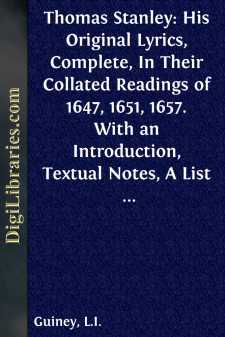Categories
- Antiques & Collectibles 13
- Architecture 36
- Art 48
- Bibles 22
- Biography & Autobiography 813
- Body, Mind & Spirit 142
- Business & Economics 28
- Children's Books 17
- Children's Fiction 14
- Computers 4
- Cooking 94
- Crafts & Hobbies 4
- Drama 346
- Education 46
- Family & Relationships 57
- Fiction 11829
- Games 19
- Gardening 17
- Health & Fitness 34
- History 1377
- House & Home 1
- Humor 147
- Juvenile Fiction 1873
- Juvenile Nonfiction 202
- Language Arts & Disciplines 88
- Law 16
- Literary Collections 686
- Literary Criticism 179
- Mathematics 13
- Medical 41
- Music 40
- Nature 179
- Non-Classifiable 1768
- Performing Arts 7
- Periodicals 1453
- Philosophy 64
- Photography 2
- Poetry 896
- Political Science 203
- Psychology 42
- Reference 154
- Religion 513
- Science 126
- Self-Help 84
- Social Science 81
- Sports & Recreation 34
- Study Aids 3
- Technology & Engineering 59
- Transportation 23
- Travel 463
- True Crime 29
Thomas Stanley: His Original Lyrics, Complete, In Their Collated Readings of 1647, 1651, 1657. With an Introduction, Textual Notes, A List of Editions, An Appendis of Translation, and a Portrait.
by: L.I. Guiney
Description:
Excerpt
PREFATORY NOTE
Thomas Stanley’s quiet life began in 1625, the year of the accession of that King whom English poets have loved most. He came, though in the illegitimate line, from the great Stanleys, Earls of Derby. His father, descended from Edward, third Earl, was Sir Thomas Stanley of Leytonstone, Essex, and Cumberlow, Hertfordshire; and his mother was Mary, daughter to Sir William Hammond of St. Alban’s Court, Nonington, near Canterbury. Following the almost unbroken law of the heredity of genius, Stanley derived his chief mental qualities from his mother; and through her he was nearly related to the poets George Sandys, William Hammond, Sir John Marsham the chronologer, Richard Lovelace and his less famous brother; as, through his father, to a fellow-poet perhaps dearer to him than any of these, Sir Edward Sherburne.
His tutor, at home, not at College, was William Fairfax, son of the translator of Tasso. With translation in his own blood, that accomplished and affectionate gentleman succeeded in inspiring his forward charge with a taste for the same rather thankless game, and with a love of modern foreign classics which he never lost. It was thrown at Stanley, afterwards, that in courting the Muses, he had profited only too well by Fairfax’s aid: but the charge, if ever a serious one at all, was absurdly ill-founded. It may have been based on a wrong reading of that very generous acknowledgement beginning: ‘If we are one, dear friend,’ which is printed in this volume; for the muddled misconstruing mind has existed in every intellectual society. Nothing is plainer than that Stanley, both by right of natural genius and of fastidious scholarship, was more than capable of beating his music out alone.
The boy was sent to Pembroke College, Cambridge, before he was fifteen, and was entered as a gentleman commoner of that University, passing by no means unmarked among a brilliant generation; and there, in 1641 he graduated Master of Arts, being incorporated at Oxford in the same degree. He next set out, like all youths of his rank and age, upon that ‘grand tour’ which was still a perilous business. He returned to England in the full fury of the great Civil contest (his family having emigrated to France, meanwhile), and settled down to work, not forensic, but literary, in the Middle Temple. There he fell to editing Æschylus, turning Anacreon into English, and planning the beginnings of his History of Philosophy. Best of all, he wrote, at leisure and by liking, his charming verses. Contemporaries not a few practised this same notable detachment, building nests, as it were, in the cannon’s mouth. Choosing the contemplative life, Stanley, like William Habington and Drummond of Hawthornden, was shut in with his mental activities, while many others whom they knew and whom we know, poor gay sparks of Parnassus, were dimming and blunting themselves on bloody fields. Like Habington and Drummond also in this, he was, though a passive Royalist, Royalist to the core....


